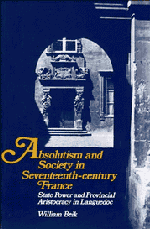 Absolutism and Society in Seventeenth-Century France
Absolutism and Society in Seventeenth-Century France Published online by Cambridge University Press: 05 July 2011
We have seen that one aspect of Louis XIV's success in winning the loyalty of the rulers of Languedoc was the popularity of the programs he carried out. The various agencies, especially the Estates, were swept up in activities which satisfied deep-felt needs and fulfilled many ambitions. There were advantages to participating in the successful regulation of troops, the measuring and embellishing of waterways, the suppression of Protestants. The provincial authorities were also becoming integrated into a larger, more unified network of personal contacts leading to the king, and their opportunities for taking advantage of the profits of state finance were greatly expanded. But these elements of a larger, more effective government do not tell the whole story. The reason for the adulation and conformity lay deeper than particular administrative achievements which, after all, had their disadvantages as well as their attractions. They lay in the very nature of absolutism as a system which protected the rank and hierarchy of a class of advantageously placed landowner-officers and in Louis's ability to reinforce these relationships.
The king's particular genius lay in his capacity for personifying traditional relationships while making them work through improved coordination. More specifically, his success can be analyzed in terms of three techniques, each of which was a skillful new utilization of age-old resources. First was the transmission through newly-expanded bureaucratic channels of the classic absolutist message that obedience to a personal sovereign should be unlimited.
To save this book to your Kindle, first ensure [email protected] is added to your Approved Personal Document E-mail List under your Personal Document Settings on the Manage Your Content and Devices page of your Amazon account. Then enter the ‘name’ part of your Kindle email address below. Find out more about saving to your Kindle.
Note you can select to save to either the @free.kindle.com or @kindle.com variations. ‘@free.kindle.com’ emails are free but can only be saved to your device when it is connected to wi-fi. ‘@kindle.com’ emails can be delivered even when you are not connected to wi-fi, but note that service fees apply.
Find out more about the Kindle Personal Document Service.
To save content items to your account, please confirm that you agree to abide by our usage policies. If this is the first time you use this feature, you will be asked to authorise Cambridge Core to connect with your account. Find out more about saving content to Dropbox.
To save content items to your account, please confirm that you agree to abide by our usage policies. If this is the first time you use this feature, you will be asked to authorise Cambridge Core to connect with your account. Find out more about saving content to Google Drive.